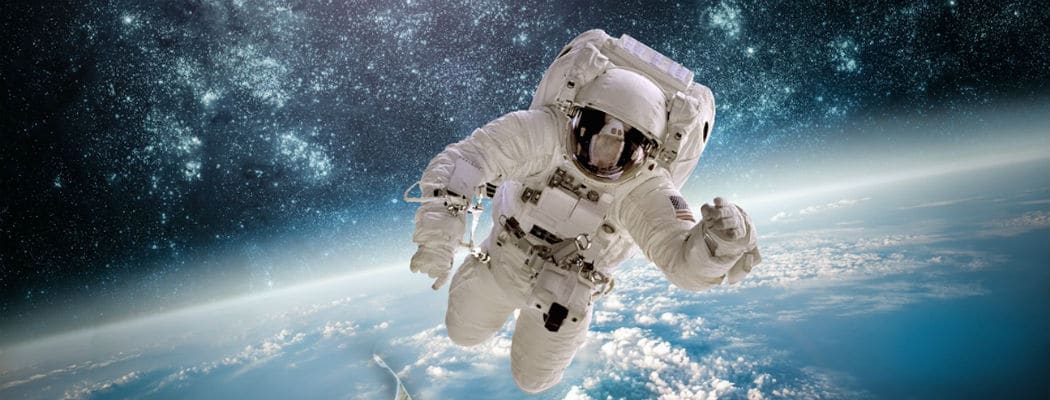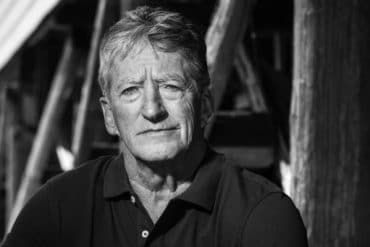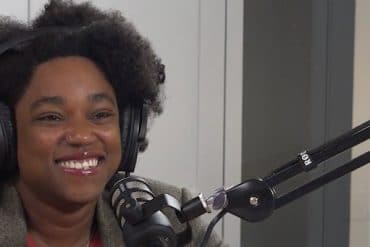Before heading back to space, NASA astronaut Andrew Feustel is scheduled to land on Nantucket this August.
Even for a man who’s looked down upon the enormity of Earth from space, the tiny island of Nantucket holds a particularly large part of Andrew Feustel’s heart. “My wife and I were engaged on Madaket Beach way back in 1989,” the NASA astronaut says. “I promised her that we would return after five years, but it actually took us about twenty-five to come back.” Last summer, the Feustels touched down on the island for the first time since their beachside engagement. Now, they’re slated to return this August during which time Andrew will give a presentation about space at the Dreamland Theater.
 Feustel has been to space two times as a NASA astronaut, once performing space walks to repair the Hubble Telescope and another visiting the International Space Station. He’s become an important face for NASA, even partnering up with Matt Damon when the actor was promoting his blockbuster film, The Martian. Today Andrew Feustel is training for yet another space mission, this time for a six-month stay on the International Space Station. Before he launches off, however, Andrew Feustel spoke to N Magazine about his upcoming mission.
Feustel has been to space two times as a NASA astronaut, once performing space walks to repair the Hubble Telescope and another visiting the International Space Station. He’s become an important face for NASA, even partnering up with Matt Damon when the actor was promoting his blockbuster film, The Martian. Today Andrew Feustel is training for yet another space mission, this time for a six-month stay on the International Space Station. Before he launches off, however, Andrew Feustel spoke to N Magazine about his upcoming mission.
N MAGAZINE: What does it feel like to get rocketed into space?
FEUSTEL: It feels just like Mr. Toad’s Wild Ride [at Disneyland]. We have no simulators to prepare for a space launch. You just have to climb in and hold on. I can tell you I was smiling from ear to ear the whole way!
N MAGAZINE: You’re scheduled for a six-month stay on the International Space Station. Can you give us an overview of your upcoming mission?
FEUSTEL: Our role as astronauts and cosmonauts on the International Space Station (ISS) is to continue the ongoing research that is being carried out every day. My mission will not be significantly different from those that have already been completed. Our job is to perform the work specified by the engineers and scientists on Earth and to ensure that the space station remains operational with respect to mechanical, electrical, thermal and life support systems.
N MAGAZINE: How has NASA’s mission changed since Kennedy pointed us to the moon?
FEUSTEL: The space program is alive and mostly well. That includes human, robotic and remote sensing exploration. NASA’s mission, “Off the Earth, for the Earth,” means that we will continue to explore with the resources that we have at hand in order to continue to make life better for us all here on Earth. The human space exploration program continues to make strides that will allow us to travel farther away from our home planet.
N MAGAZINE: What are your thoughts on people like Elon Musk who have taken that mission into their own hands with privatized space travel?
FEUSTEL: I believe that as a species we will one day have a permanent presence in space. Elon Musk is pushing the boundaries that hold us to Earth, and I believe his work is inevitable.
 N MAGAZINE: On that front, Mars is on everyone’s minds.
N MAGAZINE: On that front, Mars is on everyone’s minds.
FEUSTEL: Mars seems like the next practical step. We have some hurdles to jump before getting there, but achieving that goal will be worth the effort in the long run.
N MAGAZINE: You’re currently training for this mission in Russia; what does a typical day of training consist of?
FEUSTEL: Each day here, and back in Houston, is a lot like being in university. We are scheduled together as a crew each day with multiple classroom and simulator sessions that cover all of the critical systems and operations on the ISS. In fact, the training is equivalent to what you might receive to achieve a master’s degree. I will train for nearly twenty-two months in preparation for our six-month expedition to the space station.
N MAGAZINE: Tell us about your first mission to space.
FEUSTEL: Working on the Hubble Space Telescope during the STS-125 mission was my first experience in space. That will be one of the most significant events in my entire lifetime. It is difficult to explain the pride and amazement that I feel each and every time I see an image from deep space that was acquired by the telescope, knowing that I was so fortunate to be able to help ensure that the telescope would continue to unlock more of the secrets of the universe.
N MAGAZINE: What’s it like living in space?
FEUSTEL: What I can say is that I don’t really know yet what it is like to actually live in space. My previous missions were thirteen and sixteen days long, respectively. Once I arrive for the six-month mission in early 2018, I will really start to appreciate what it means to live in space.
N MAGAZINE: What do most people not know about being an astronaut?
FEUSTEL: Well, I can tell you what I did not know was that most astronauts go on to other careers after flying in space. I was under the impression that once someone became selected as an astronaut, that they would continue to do that work until retirement.
N MAGAZINE: What do you remember most when you returned home from your first trip to space?
FEUSTEL: There is nothing quite like the smell of dirt…something that as of now we cannot experience in space. For me, once the hatch door was open to the shuttle I could smell Earth, and in my mind, I could immediately see the beauty of the planet, even though I was still sitting inside the shuttle.
 N MAGAZINE: What’s it like seeing earth from space?
N MAGAZINE: What’s it like seeing earth from space?
FEUSTEL: If the whole world could see Earth from space, I believe we would all behave somewhat differently here on the planet. I think we would be kinder to one another and I believe we would all be humbled. Earth is our only home…that we know of now. We are literally all riding on the same space ship right now; it’s just really big and blue.
N MAGAZINE: Space travel is clearly dangerous; have you ever had a close calls in space?
FEUSTEL: I would not say space travel is “clearly” dangerous, however it is not without risk. Our job is to reduce and manage that risk to the best of our abilities. Each of us has, at one time or an- other, had a moment when we realized that we had better pay attention to the situation. I’ve experienced at least one of those moments during a spacewalk when my hand-grip was not quite what I had hoped. Fortunately, I am still here today to answer these questions.
N MAGAZINE: When you’ve been up in space, have you ever seen things that make you wonder whether we are not alone?
FEUSTEL: I think floating above the planet and seeing it placed against the back-drop of the deep black space would cause anybody to wonder if we were really alone. The building blocks for life abound in our universe so to me, there is no way that we are alone. And no, I have never seen an alien in space.
N MAGAZINE: When you’re reentering the atmosphere, and the shuttle is hitting ungodly temperatures, do you fear that the machine is going to burn up?
FEUSTEL: No. You trust the equipment and rely on your training to get you through. In the end, however, all you can do is go along for the ride…
At press time, Andrew Feustel was scheduled to deliver a presentation at The Nantucket Dreamland on August 12th in collaboration with N Magazine and the Maria Mitchell Association. For more information and to purchase tickets, click here.






